Top Stories
The Expaliner: How strong is the legal case against Donald Trump?
What’s happening
In the weeks since news that former President Donald Trump was on the brink of being indicted, there has been a nonstop flood of opinions from lawmakers and pundits about the implications of charging a former president — and current presidential candidate — with a crime. With the details of the actual indictment finally released on Tuesday, legal experts can now discuss the actual merits of the case and the legal danger it poses to Trump.
Manhattan District Attorney Alvin Bragg charged Trump with 34 felony counts connected to an alleged scheme to cover up a $130,000 hush money payment made to porn actress Stormy Daniels shortly before the 2016 election. Trump pleaded not guilty to all charges.
“We cannot and will not normalize serious criminal conduct,” Bragg said during a press conference outlining the case.
There is nothing inherently illegal about paying someone not to disclose a purported affair. But Trump is being accused of illegally plotting to falsify business records in an effort to hide the payment. Under New York law, that crime on its own is a misdemeanor, but it can be bumped up to a felony charge punishable by up to four years in prison if records were falsified with the specific intent to commit or cover up another crime. The indictment released Tuesday doesn’t specify what that second crime may be, but there are indications that Bragg may attempt to connect the payments to campaign finance violations or tax fraud.
Trump is the first former president to be formally indicted, but the case in Manhattan is far from his only source of legal jeopardy. The Justice Department is investigating his role in inciting the Jan. 6 assault on the U.S. Capitol and alleged mishandling of classified documents after leaving office. He is also facing an inquiry in Georgia over his attempts to overturn the state’s 2020 election results and multiple civil cases, including one filed by a woman who claims Trump raped her in the 1990s.
Why there’s debate
Outside of Trump and his GOP allies, who all claim that the entire case is a politically motivated “witch hunt,” there’s generally broad agreement that Bragg appears to have ample evidence to secure conviction on the misdemeanor counts of falsifying business records. There’s serious disagreement, however, on the most important issue: Will Bragg be able to successfully tie those minor violations to a secondary crime?
Skeptics from both sides of the political spectrum say the felony portion of the case is built on shaky and untested legal reasoning that will require ironclad evidence to prove — evidence many believe Bragg likely doesn’t have. There are also major technical issues that could derail the indictment, most notably the untested question of whether a federal crime like a campaign finance violation can count as a secondary crime under New York’s state-level business records law. Some doubters add that the strength of Bragg’s case is irrelevant if the trial isn’t completed in time for the 2024 election, a prospect they say is extremely unlikely.
But others argue that the case isn’t nearly as weak as skeptics make it out to be. They say Bragg and his team, who have jurisdiction over the beating heart of the U.S. financial system, are incredibly adept at litigating complex financial issues such as this one. The lack of details about how Bragg plans to connect critical dots in the case, they add, is a sign that the district attorney is merely saving his most potent ammunition for later, not that he doesn’t have it.
Finally, some legal commentators say the indictment is so short on details and the circumstances so unprecedented that it’s impossible at this early stage to make any real judgments about how the case might play out.
What’s next
Trump’s next in-person hearing in the case is scheduled for Dec. 4, just two months before voting in the Republican presidential primary begins. It’s likely, though, that Trump’s legal team will file a number of motions seeking to challenge the case in the coming months that could reveal more information about the evidence Bragg intends to rely on in trying to convict the former president.
Perspectives
Even the small amount of information we have shows that Bragg has plenty of evidence to support his case
“The statement of facts provides ample evidence and detailed evidence of the contours and the aspects of this scheme to defraud, and to conceal payments because there was an election coming up. When you have documents that are blatantly false, and apparently you have that here, and you have witnesses that corroborate each other, that combination is very powerful for a jury. … That’s a bold allegation. And if it’s proven, it has a lot of jury appeal.” — Gene Rossi, former federal prosecutor, to USA Today
Bragg is withholding details about the case because he knows it’s built on quicksand
“We needn’t speculate why Bragg is being so coy about this. He doesn’t have another crime. At his press conference, he blathered about federal campaign-finance law, but he knows he lacks jurisdiction to enforce federal law. He further mumbled something about state election laws, but those — as you might imagine — apply to elections for state office, not the presidency.” — Andrew C. McCarthy, National Review
We shouldn’t assume Bragg is out on a limb because he didn’t make his entire strategy public right away
“Bragg did not cite specific statutes he will rely upon to pursue felonies. But there is nothing sneaky or underhanded about that. Bragg presented what he thought he needed to — no more and no less. Media impatience is no reason to reveal more in an indictment than he would normally do at this stage.” — Jennifer Rubin, Washington Post
Until there’s clear evidence of a second crime, the case should be treated as a flop
“Here’s the big question that Mr. Bragg still hasn’t adequately answered: Where is the second crime? Recall that falsifying business records is a misdemeanor in New York. It’s a felony only if the books were cooked with ‘an intent to commit another crime or to aid or conceal the commission thereof.’ When Mr. Trump worked out this reimbursement arrangement with Mr. Cohen, what other crime was he allegedly trying to cover up?” — Editorial, Wall Street Journal
Bragg and his team have a ton of experience getting convictions in cases just like this
“We can now say that there’s nothing novel or weak about this case. The charge of creating false financial records is constantly brought by Mr. Bragg and other New York D.A.s. In particular, the creation of phony documentation to cover up campaign finance violations has been repeatedly prosecuted in New York. That is exactly what Mr. Trump stands accused of.” — Karen Friedman Agnifilo and Norman Eisen, New York Times
There’s a real possibility the case gets thrown out before it ever even gets to trial
“There is a serious risk that a New York judge will toss out the charges against Trump on technical legal grounds unrelated to the former president’s actual conduct. And even if Bragg’s legal team convinces New York’s own courts that this prosecution may move forward, there is also a very real danger that the Supreme Court of the United States, with its GOP-appointed supermajority, could decide that it needs to weigh in on whether Trump should be shielded from this prosecution.” — Ian Millhiser, Vox
Just because a legal theory is untested doesn’t mean it’s weak
“The mere fact that a legal theory is arguably ‘novel’ or concerns highly unusual facts does not mean that it is invalid or somehow illegitimate under the law. It means that prosecutors will need to try to amass a robust legal basis — drawing on the text and historical underpinnings of the relevant statutes as well as broader legal principles — to persuade both the trial and appellate courts to rule in their favor.” — Ankush Khardori, New York
Connecting all the dots in a way that proves convincing to a jury will be a huge challenge
“These charges will be difficult to prove. There can be no doubt that the district attorney faces an uphill climb. They tell the story of a complex conspiracy to illicitly alter the course of the 2016 election—potentially, a powerful tale of corruption that persuades both the jury and the public of this prosecution’s necessity. But Bragg’s legal theory is, if not convoluted, a fairly confusing effort to patch together disparate offenses into one alleged crime. … This is not at all the slam-dunk case that so many Democrats wanted.” — Mark Joseph Stern, Slate
None of the details of the case matter at all if it’s not decided before the election
“Bragg’s specific case—that Trump falsified business records—is strong, and, it would appear, is backed up by ample documentary evidence. But, as usual, Trump’s goal is simply to delay the proceedings until well past the point of the 2024 election. As it stands, he’s already close to accomplishing that goal.” — Elie Mystal, The Nation
The weakness of this case may make it harder to convict Trump on more serious crimes
“Not only may Trump potentially beat the charges, at trial or on appeal. He may be able to use those charges to create the impression among his supporters that he is a victim of politically motivated vendetta. In turn, that may make it harder for Georgia or federal prosecutors to bring and sustain much more serious charges against him.” — Noah Feldman, Bloomberg
There are far too many unknowns to do anything more than speculate
“As the case progresses, Bragg will be forced to show his hand (likely in response to motions by Trump) and we’ll learn more about his specific theories and their chance of success. For now, be skeptical of certain predictions.” — Ken White, Rolling Stone

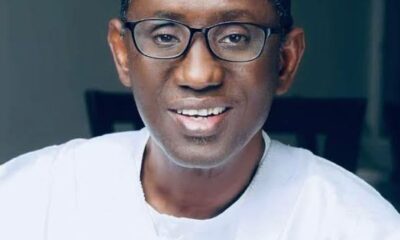
 Top Stories20 hours ago
Top Stories20 hours agoTinubu Deliberately Put Northerners In Key Places – Ribadu
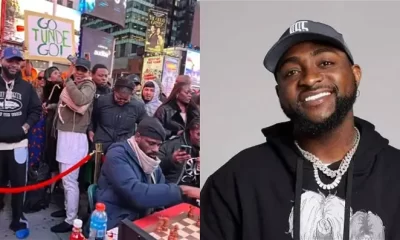
 Entertainment8 hours ago
Entertainment8 hours agoGuinness World Record: Davido, Sowore Turn Up To Support Chess Master, Onakoya
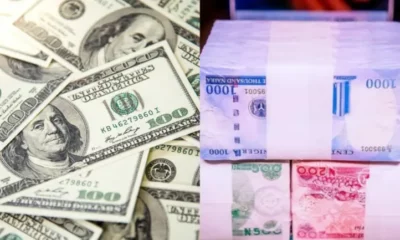
 News18 hours ago
News18 hours agoBlack Market Dollar (USD) To Naira (NGN) Exchange Rate Today 19th April 2024
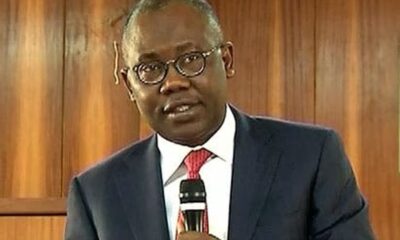
 Top Stories8 hours ago
Top Stories8 hours agoCourt Discharges, Acquits Ex-AGF Adoke Of Money Laundering

 Business and Brands7 hours ago
Business and Brands7 hours agoUBA America Strengthens Commercial Diplomacy, Hosts Diplomats, Business Leaders at World Bank Summit in Washington.

 Politics20 hours ago
Politics20 hours agoIsraeli Missiles Hit Iran, Iraq And Syria
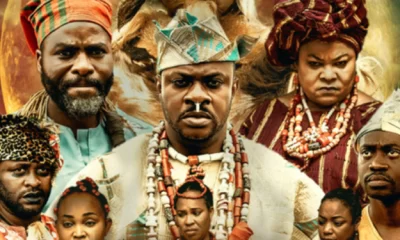
 Entertainment20 hours ago
Entertainment20 hours agoNollywood Eniola Ajao’s movie ‘Ajakaju’ rakes over N200 million in cinemas

 Top Stories19 hours ago
Top Stories19 hours agoResolutions of PDP NEC meeting emerges [FULL TEXT]





